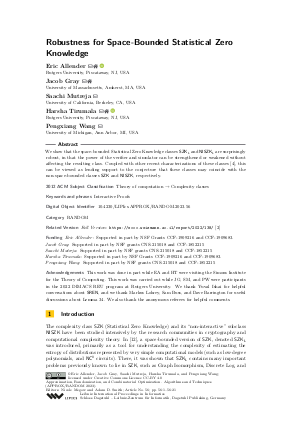@InProceedings{allender_et_al:LIPIcs.APPROX/RANDOM.2023.56,
author = {Allender, Eric and Gray, Jacob and Mutreja, Saachi and Tirumala, Harsha and Wang, Pengxiang},
title = {{Robustness for Space-Bounded Statistical Zero Knowledge}},
booktitle = {Approximation, Randomization, and Combinatorial Optimization. Algorithms and Techniques (APPROX/RANDOM 2023)},
pages = {56:1--56:21},
series = {Leibniz International Proceedings in Informatics (LIPIcs)},
ISBN = {978-3-95977-296-9},
ISSN = {1868-8969},
year = {2023},
volume = {275},
editor = {Megow, Nicole and Smith, Adam},
publisher = {Schloss Dagstuhl -- Leibniz-Zentrum f{\"u}r Informatik},
address = {Dagstuhl, Germany},
URL = {https://drops.dagstuhl.de/entities/document/10.4230/LIPIcs.APPROX/RANDOM.2023.56},
URN = {urn:nbn:de:0030-drops-188815},
doi = {10.4230/LIPIcs.APPROX/RANDOM.2023.56},
annote = {Keywords: Interactive Proofs}
}

 Creative Commons Attribution 4.0 International license
Creative Commons Attribution 4.0 International license




